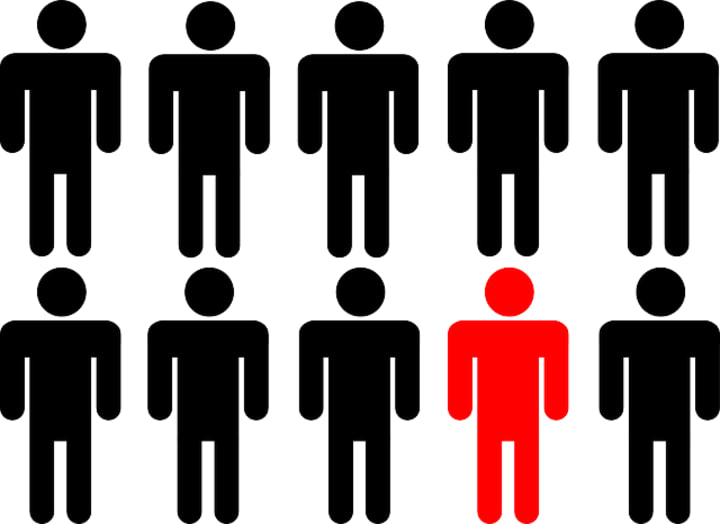6 Mental Health Workplace Myths
Why These Myths Simply Aren't True

When it comes to having a mental illness and having a job, there are, understandably, a lot of fears.
There are also many different myths that we begin to believe as truths because, when you have a mental illness, the negative thoughts feel like the truth to us.
It is important to know and understand what the facts actually are, and not buy into or believe in the myths that either we tell ourselves, or that others tell us.
Below you will find six common myths about mental health and the workplace.
#1 Talking about my mental health with co-workers or management could jeopardize my job

In most cases, this is very untrue. I believe that this is more of a fear that people have. Society is more educated about mental health and mental illnesses now than they were before.
From my own personal experience, letting my co-workers and management know that I suffer from severe depression has made them more understanding and aware if I feel that I need a quick break.
My managers and co-workers also check in from time to time to make sure that everything is ok, that I am not overly stressed, and whether or not I need some extra time off.
The fact that my co-workers know that I suffer from depression also helps in providing an explanation if I become quiet or seem anxious.
This isn't to say that you should go into deep details about everything you go through with your mental illness. You don't need to divulge the details, but just letting them know that you suffer from a mental illness just makes them aware of your situation and if there are any special needs or assistance you need at work.
#2 I need a diagnosis before I can start to get better and do my job properly

This is another myth and misunderstanding. Having a diagnosis only helps the doctors identify what line of medications and therapies will be helpful to you. It also helps you to get a better understanding of everything you are experiencing.
The fact is, you don't need a diagnosis to start working on getting better. You know what your symptoms are and you can use certain coping strategies and types of therapies, such as Cognitive Behavioral Therapy (CBT) to start your journey to feeling better.
There are a variety of tools and therapies you can self-teach yourself to cope with different symptoms of different mental illnesses.
#3 If I have a mental illness I am not as valuable of an employee

This myth is far from the truth. Oftentimes, people who have a mental illness tend to view things differently from others.
Having a mental illness in the workplace only means that you may have additional struggles outside of the norm.
With mental illness comes the ability to problem solve as you search for answers and solutions to your own problems, which is a very valuable asset to have in the workplace.
Experiencing a mental illness often gives the person more compassion and understanding of others, which again is a very valuable asset when dealing with co-workers and especially when dealing with clients.
Although it can be hard to find and takes some detective work to search it out, there are a lot of things that are beneficial that having a mental illness gives understanding to and abilities that some people never develop.
#4 If the people I work with know I have a mental illness they will treat me differently

More often than not, your co-workers won't constantly be thinking about you having a mental illness. If they see you struggling, or if you seem off it will likely trigger the recognition that you suffer from a mental illness and they may check in on you.
Other than those times, if you are doing your job, it won't matter to them and they will treat you no differently.
I can say this from experience. Everyone I work with knows that I suffer from a mental illness. They have never treated me any differently and oftentimes rely on me to get things done because they know that I do what needs to be done instead of dragging my feet.
Unless I am having a really bad day with the depression, I have never noticed any of my co-workers treat me differently. On the days that have been bad, the only way they treated me differently was to tell me not to worry about getting a bunch of work completed. Just do what I could and anything I don't get to not to worry about it.
#5 If I have a mental illness I can't work

This is another myth and a huge one at that. There are so many people who work and have a mental illness.
Yes, there are various levels to the severity of mental illness people experience. People with a severe mental illness may not be able to work as much, or in some cases not at all.
However, most people with mild and even moderate levels of a mental illness, are still fully capable of working a full-time job.
Even people with a severe mental illness may someday get to a point where they can work at least part-time.
I went about twelve years where I couldn't work. I would try returning to work about every two years and end up in the psych ward within three weeks. However, I am now working a part-time job, and I know that if I could get hired for the type of job that I know I could work full time in, I could do it.
#6 If I have a mental illness working will just make it worse

This one is kind of a yes and a no.
This will largely depend on the severity of your mental illness, your mental and emotional stability, and your coping abilities.
Remember that when dealing with a mental illness there is a lot of negative thinking and feelings. One of the best ways to combat that is with positive reinforcement.
If you are capable of working, then going to work and doing your job will give you a sense of accomplishment as well as a sense of contributing. You will also have the social aspect with your co-workers and/or customers/clients.
My depression has been severe, to levels that, according to my doctors, most people don't experience. Because of this, I understand the value of laughter and just how much it can make a difference in someone's day.
Even though I may be feeling depressed, anxious, and having negative thoughts, when I go to work I do my best to joke around with my co-workers. I get them smiling and laughing and you can visibly see the stress start to melt away on them.
This helps to give a sense of purpose and meaning. It helps to make me feel better knowing that I have helped my co-workers feel a bit better in their stressful day.
Final Thoughts
Most of the myths above are fears that people with a mental illness have about working while also trying to deal with whatever they're going through.
Most people will experience only mild to moderate levels in the severity of their mental illness. Most of those people are still able to work at least part-time and many even full-time.
Having the proper resources and coping skills will make all the difference in the world when it comes to working and having a mental illness. Just because you suffer from a mental health issue, doesn't mean that you can't work, can't contribute, and have to keep it to yourself.
Obviously, I wouldn't suggest going into detail with your managers and co-workers to the extent of what exactly you deal with. However, letting them know that you have a mental illness will allow for understanding from them if they see you starting to struggle.
Work what you are capable of working. There is a huge sense of accomplishment and contribution when you are working. Also, the social aspect is very helpful as a lot of people with a mental illness tend to isolate.
Even if you are currently not able to work, don't give up on yourself and allow yourself to believe you will never work again.
My doctors had nothing left to offer me in the way of medications and treatments. I was in the hospital in the psych ward, on average, three times a year for anywhere from a week to a month at a time.
Yet here I am, now working part-time. Yes, it took a long time, and it took a lot of self-teaching with different coping skills. If you apply yourself though, you can do it.
Don't lose hope, but most importantly, don't give up on yourself.
About the Creator
Richard Bailey
I enjoy writing about many different topics but my main focus is mental health, mental illness, and specifically depression. I have a long personal experience with Severe Treatment-Resistant Depression and Anxiety.
Reader insights
Nice work
Very well written. Keep up the good work!
Top insight
Eye opening
Niche topic & fresh perspectives







Comments (4)
Focusing on your day-to-day work can also influence mental health positively, as while working dedicatedly, we are more focused on work and less worried about our problems. Mental health problems grow only when we start to think about them. Hence, as I have experienced, work can be a great distraction too.
For me, personally, myths numbers 5 and 6 are both the exact opposite of my personal truth. For my mental health, my job was essential. Now that I'm currently out of work for a physical health issue, I am noticing more than ever exactly how much my job impacted my mental health. My coworkers were, for the most part, my closest friends. I still talk to them often. My job gave me self-confidence. It gave me a sense of accomplishment to ward off the "I can't do anything right" and "I'm worthless and useless" intrusive thoughts that are so common for a lot of us with mental issues. I am a strong advocate of finding a job that you enjoy with people you like as a valuable mental health tool. Thank you for this article!
I have to appreciate this article! I have Social Anxiety Disorder, but people around me have been being so nice to me, so it turns out that all of my misconceptions about mental illness (including those in the article) are mostly not true. Love your work🤗
a very compassionate article about a "problem" that is more widespread than we know- also a little touch of OCD can make a person a very good worker!